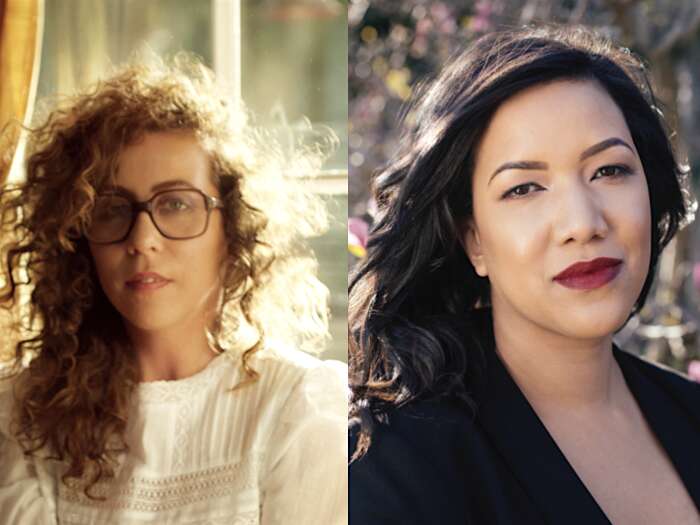2020 Kingsley & Kate Tufts Poetry Awards Go to Ariana Reines and Tiana Clark

Ariana Reines’s A Sand Book (Tin House) has been selected as the winner of the 2020 Kingsley Tufts Poetry Award, and Tiana Clark’s I Can’t Talk About the Trees Without the Blood (University of Pittsburgh Press) has been chosen for the 2020 Kate Tufts Discovery Award.
Reines is the 28th poet to be honored with the $100,000 annual award, whose past winners include B.H. Fairchild, Angie Estes, Henri Cole, Thomas Lux, Linda Gregerson, D.A. Powell, Ross Gay, and Patricia Smith, among others.
Clark joins a group of Discovery winners that also includes Yona Harvey, Charles Harper Webb, Beth Bachmann, and Diana Khoi Nguyen.
“Both of this year’s winners have written big, bold, and audacious books. They contain enormities; they’re so rich in detail,” said Finalist Judging Chair Timothy Donnelly, who received the Kingsley in 2012 for The Cloud Corporation.
Donnelly and his fellow judges—Meghan O’Rourke, Khadijah Queen, Luis J. Rodriguez, and Sandy Solomon—chose this year’s winners from five finalists in each category. This year’s pool of finalists was selected from some 500 nominations submitted over the past year by individuals and publishers.
Both poets were notified of their selection by CGU President Len Jessup, Donnelly, the judges, and a small group of guests who called the winners over the weekend to deliver the good news.
The winners will receive their awards during a private ceremony at CGU on April 15, followed by a public reading on April 16 at the Huntington Library, Art Collections, and Botanic Gardens in San Marino, Calif.
Established in 1992 at CGU by Kate Tufts in memory of her husband Kingsley, a Los Angeles shipping executive and poet, the Kingsley award is one of the largest annual prizes in recognition of the work of a mid-career poet. A year later, the Discovery award was established to honor an emerging poet with a $10,000 award.

About The Winners
Named by Flavorwire as one of the 100 best living writers and “a crucial voice of her generation” by critic Michael Silverblatt, Ariana Reines is an award-winning poet, Obie-winning playwright, performing artist, and translator.
Currently a divinity student at Harvard University, Reines has taught at Columbia University, the European Graduate School, NYU, Tufts, Naropa, The New School, Yale, and many others. She also has served as a MacDowell Fellow, a resident at the TS Eliot House, a fellow at The Center for the Humanities at Tufts, and a Brown Foundation Fellow at the Dora Maar House, among others.
Her works include the poetry collections The Cow, which received the 2006 Alberta Prize; Coeur de Lion; Mercury; and The Origin of the World. Her Obie-winning play Telephone (2009) was commissioned by The Foundry Theatre and has been performed in Norwegian translation (2017), at KW Berlin (2018), and many others.
Of A Sand Book, Donnelly told guests Saturday evening that he thought Emily Dickinson “would have loved Reines’s book.”
“When Dickinson said, ‘if I feel physically as if the top of my head were taken off, I know that is poetry,’ that is what Reines’s book does to me,” he explained. “I believe it truly to be a work of genius. It is powerful; it is of our moment; it is mystical; it knows no bounds. When my daughters are older, I will give this book to them. It will teach them many things about being in this world.”
Donnelly similarly praised Discovery Award winner Clark for the linguistic virtuosity of her debut collection.
“It’s impossible for me to believe that this book, which is so substantial, is a first book,” he said. “The poems are so full of vitality, of life, the phrasing so ravishing you can only take so much of it at a time.”
Clark is a 2019 National Endowment for the Arts Literature Fellow and a recipient of a 2019 Pushcart Prize, as well as a winner of the 2017 Furious Flower’s Gwendolyn Brooks Centennial Poetry Prize and 2015 Rattle Poetry Prize. A graduate of Vanderbilt University and Tennessee State University, where she studied Africana and women’s studies, she teaches creative writing at Southern Illinois University at Edwardsville.

The “Best Phone Calls to Make”
The tradition of a CGU gathering to phone the winners is a special touch in keeping with the informal, personal manner of the awards’ founder, Kate Tufts.
“These are the best phone calls to make,” said Lori Anne Ferrell, dean of the university’s School of Arts & Humanities and the director of the awards. “Kate was a very warm and gregarious person, and so it makes sense to notify our winners directly rather than through their publishers. It’s something I think she’d want us to keep doing.”
Ferrell added that the tradition of contacting the winners the old-fashioned way, via a phone call, has “led to some lovely, touching, and very human moments in our awards’ histories.”
“The surprise and joy of their reactions are such powerful reminders to us of the special place that these awards hold in the poetry world,” she said. “We are so grateful to Kate for choosing CGU as their home.”